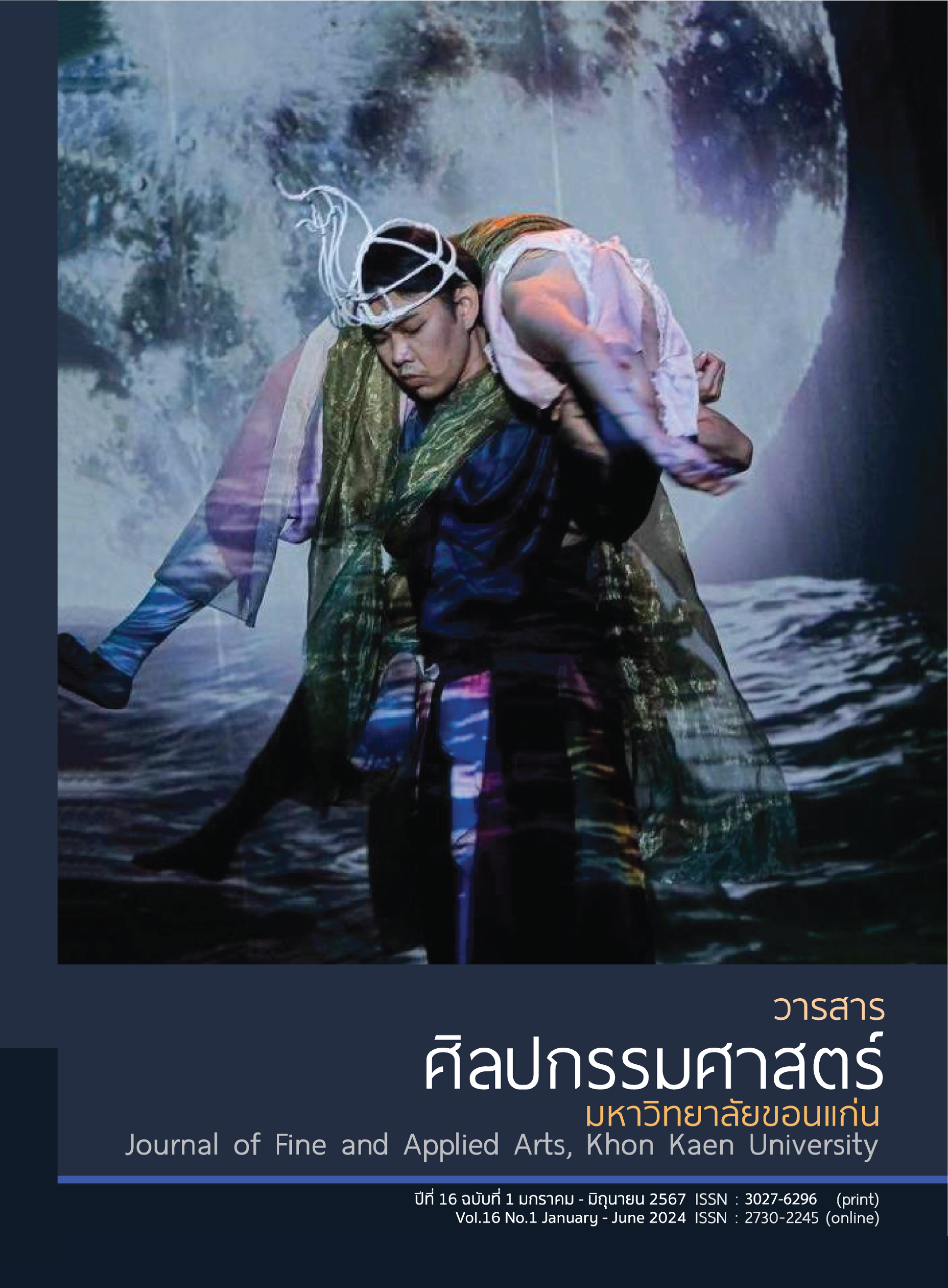The Creation of Contemporary Lam Mu Performance A Case Study of Nang Ai the Life and Love
Main Article Content
Abstract
The article outlines a creative research process aimed at achieving two main objectives. Firstly, it seeks to discover strategies for crafting contemporary Lam Mu performances by utilizing devised theatre methods to experiment with participants, while drawing inspiration from the ancient Isan literature "Pha Daeng Nang Ai" as a foundational framework. Secondly, it aims to develop a Lam Mu performance that is contemporary both in the ideas conveyed and the performance style, tailored to resonate with the target audience, all while preserving the intrinsic value of the Lam Mu tradition. The research is centered on practical application and experimentation, involving the synthesis of elements from traditional Lam Mu performances with modern theatre techniques. The findings revealed a departure from the conventional form of Lam Mu performances, resulting in what the researcher termed "Hybrid Mor Lam". This style of Lam Mu performance endeavored to convey the essence of the narrative while addressing contemporary social issues. Through the amalgamation of singing (ลำ) and acting, the character's thoughts and emotions were effectively communicated. Additionally, dance (ฟ้อน-เต้น) played a vital role in storytelling, employing moving imagery, while the directing process served to unify the stage elements and effectively convey the narrative to the audience.
Article Details

This work is licensed under a Creative Commons Attribution-NonCommercial-NoDerivatives 4.0 International License.
Content and information in articles published in the Journal of Fine and Applied Arts of Khon Kaen University is regarded as the opinion and sole responsibility of the author(s) directly; therefore, editors are not obliged to agree to or share any responsibility with regard to the content and information that appears within these articles.
All articles, information, content, image, etc. that have been published in the Journal of Fine and Applied Arts of Khon Kaen University is the copyright of the Journal of Fine and Appllied Arts of Khon Kaen University. Any person or organization who wishes to distribute all or parts of the articles for further dissemination or other usage must first receive permission from the Journal of Fine and Applied Arts of Khon Kaen University before proceeding to do so.
References
จารุบุตร เรืองสุวรรณ. (2520). ลักษณะวรรณกรรมอีสาน. กาฬสินธุ์ : จินตภัณฑ์การพิมพ์
ธนัชพร กิตติก้อง. (2559). การวิจัยสร้างสรรค์ด้านศิลปะการแสดง. วารสารศิลปกรรมศาสตร์ มหาวิทยาลัยขอนแก่น, 8(1), 107-130.
นพมาส แววหงส์ และคณะ. (2553). ปริทัศน์ศิลปะการละคร. กรุงเทพฯ : โครงการเผยแพร่ผลงานวิชาการ คณะอักษรศาสตร์ จุฬาลงกรณ์มหาวิทยาลัย.
บุษกร บิณฑสันต์, และขำคม พรประสิทธิ์. (2553). หมอลำ. กรุงเทพฯ : สำนักพิมพ์แห่งจุฬาลงกรณ์มหาวิทยาลัย.
ปณิตา น้อยหลุบเลา. (2560). ผาแดงนางไอ่: พลวัตวรรณกรรมท้องถิ่นกับบทบาทการสร้างพลังชุมชน. วิทยานิพนธ์ปริญญาปรัชญาดุษฎีบัณฑิต สาขาภาษาไทย คณะมนุษยศาสตร์และสังคมศาสตร์ มหาวิทยาลัยมหาสารคาม.
ปรีชา พิณทอง. (2524). วรรณคดีอีสานเรื่องผาแดง-นางไอ่. อุบลราชธานี: ศิริธรรม.
พชญ อัคพราหมณ์. (2566). พชญ อัคพราหมณ์. [ม.ป.ท.: ม.ป.พ.].
พรรัตน์ ดำรุง. (2557). ละครประยุกต์ การใช้ละครเพื่อการพัฒนา. กรุงเทพฯ : สำนักพิมพ์แห่งจุฬาลงกรณ์มหาวิทยาลัย.
พรรัตน์ ดำรุง. (2564). วิจัยการแสดง สร้างความรู้ใหม่ด้วยการทำละคร. กรุงเทพฯ : ภาพพิมพ์.
พัฒนา กิติอาษา. (2557). สู่วิถีอีสานใหม่. กรุงเทพฯ : วิภาษา.
พีรพงศ์ เสนไสย. (2547). สายธารแห่งฟ้อนอีสาน. ขอนแก่น : คลังนานาวิทยา.
มัทนี รัตนิน. (2549). ความรู้เบื้องต้นเกี่ยวกับศิลปะการกำกับละคอนเวที. กรุงเทพฯ : สำนักพิมพ์มหาวิทยาลัยธรรมศาสตร์
เยาวรัตน์ การพานิช. (2538). หลักการละครตะวันตกและละครตะวันตกสมัยใหม่. ขอนแก่น : ภาควิชาภาษาต่างประเทศ คณะมนุษยศาสตร์และสังคมศาสตร์ มหาวิทยาลัยขอนแก่น.
ศิราพร ณ ถลาง. (2563). ทฤษฎีคติชนวิทยา วิธีวิทยาในการวิเคราะห์ตำนาน-นิทานพื้นบ้าน. กรุงเทพฯ : สำนักพิมพ์จุฬาลงกรณ์มหาวิทยาลัย.
โศภิตสุดา อนันตรักษ์. (2534). การวิเคราะห์ลำเรื่องต่อกลอน. วิทยานิพนธ์ปริญญาการศึกษามหาบัณฑิต สาขาเอกภาษาไทย บัณฑิตวิทยาลัย มหาวิทยาลัยศรีนครินทรวิโรฒ
สดใส พันธุมโกมล. (2524). ศิลปการละครเบื้องต้น. กรุงเทพฯ : โรงพิมพ์คุรุสภา ลาดพร้าว.
เอกศักดิ์ ยุกตะนันท์. (2554). มนุษย์กับการรู้จักตนเอง: การรู้จักตนเองสำหรับคนหนุ่มสาวในสังคมไทย. ขอนแก่น : โรงพิมพ์มหาวิทยาลัยขอนแก่น.
เออร์บินเนอร์. (2564). ทฤษฎีลำดับขั้นความต้องการของมาสโลว์. ค้นเมื่อ 9 มีนาคม 2567. จาก https://www.urbinner.com/post/maslow-hierarchy-of-needs#viewer-352mq
Crossley, M., & Yarker, J. (2017). Devising theatre with Stan’s Café. London : Bloomsbury Publishing.
Gabbert, L. (2018). Folk drama. Humanities, 7(2), 1-11.
Green, T. A. (1981). Introduction folk drama special issue. Journal of American Folklore, 94, 421–432.
Harvey, J., & Lavender, A. (2010). Making contemporary theatre: International rehearsal processes. Manchester: Manchester University Press.
Heddon, D., & Jane, M. (2005). Devising performance: A critical history. Basingstoke : Palgrave Macmillan.
Hodgson, J., & Richards, E. (1966). Improvisation: Discovery and creativity in drama. London : W. & J. Makey.
Khan, A. (2013). A study of theatre techniques in modern drama with particular reference to Pirandello Brecht and Albee. Retrieved January 10, 2024, from https://core.ac.uk/download/pdf/144526792.pdf
Oddey, A. (1994). Devising theatre. New York : Routledge.
Pettit, T. (1997). Drama, folk. In T. A. Green (Ed.). Folklore: An encyclopedia of beliefs, customs, tales, music, and art. (pp. 205–212). Santa Barbara : ABC-CLIO.
Pickering, K. (2010). Key Concepts in Drama and Performance. London : Bloomsbury Publishing.


